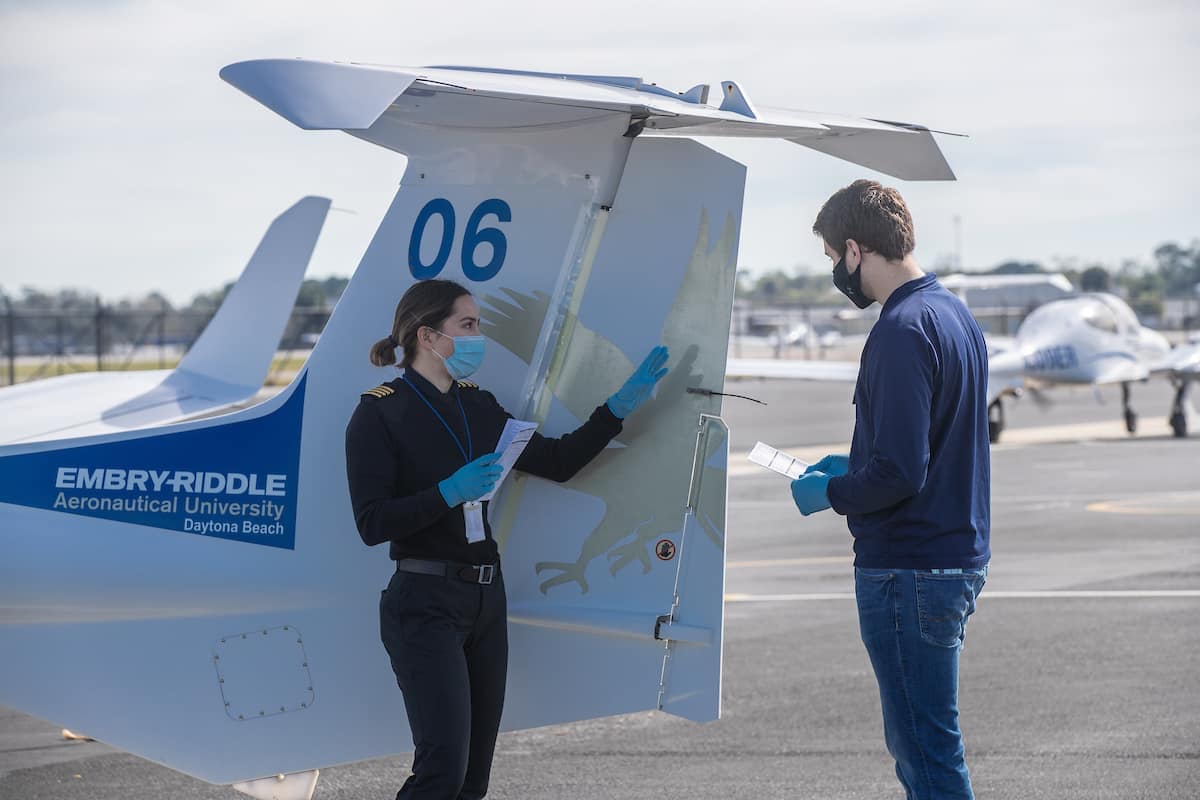Aviation Week Op-Ed: How Pandemic Lessons Could Improve Flight-Training Safety

This Aviation Week op-ed explores how Embry-Riddle Aeronautical University drew on aviation’s safety culture to develop new flight training methods amid the COVID-19 pandemic. Embry-Riddle President P. Barry Butler, Ph.D. writes that such evolution is crucial “to keep learning, keep flying and keep educating — safely.” This essay — published in January 2021— is available to read at the Aviation Week website and below.
By P. Barry Butler
Flight training amid the COVID-19 pandemic has been a major challenge, and it will not be the last. But fortunately, a consortium of university-based flight programs are sharing and applying lessons learned to help ensure that the aviation talent pool remains robust — and ready for the next crisis.
The industry will recover — just as it did after other crises such as 9/11, severe acute respiratory syndrome and the Great Recession — and the demand for pilots will return. When it does, we cannot be caught flatfooted.
The 2020 Boeing Pilot and Technician Outlook, updated in October, projects that 763,000 new civil aviation pilots and 739,000 new maintenance technicians will be needed to fly and maintain the global fleet of aircraft over the next 20 years. Canadian training and simulator provider CAE estimated in November that the civil aviation industry will need 264,000 new pilots by 2030. Some equipment manufacturers for the U.S. Defense Department never saw a reduction in the need for talent (Northrop Grumman, in fact, still needs more than 1,000 maintainers). The military continues to need not only pilots but aviation leaders. And even grounded aircraft require regular care by aviation maintenance technicians.
The industry has certainly hit the pause button but not the stop button. The question is: How do we continue to train flight students to serve a post-pandemic world in a learning environment that is inherently close-contact?
Collaborate Outward: Under unprecedented circumstances, a national consortium of university flight programs has worked together to develop numerous improvements to flight operations during the pandemic. Kenneth Byrnes, Embry-Riddle Flight Department chair and College of Aviation associate dean, formed a group in May that hosts monthly conversations with flight leaders across the country. These leaders share concerns, tips and best practices. This partnership has helped in the development of mask etiquette and sanitization standards for sensitive avionics, provided touchless alternatives for logbook entries and other paperwork, and guided the production of training videos as well as two studies on the safety of using masks on the flight deck.
Checklists, Checklists, Checklists: We lean on the standards that have always defined aviation’s safety culture — starting with checklists. In addition to the routine preflight checklists, wellness measures — such as daily temperature checks, mandatory face coverings, flight deck and hangar sanitization and testing — have been added as requirements. These procedures stand as the foundation upon which our flight departments operate and establish a high bar for the rest of the university.
Encourage Self-Reporting: Ensuring students and faculty understand that self-reporting errors will not result in disciplinary action has been tremendously important in developing not only a culture of safety on campus but also one of shared accountability. The Flight Department’s Safety Management System (SMS), for instance, includes an option for anonymous reporting. We also leverage the FAA-approved Aviation Safety Action Program (ASAP) to offer students and instructors multiple platforms on which to track and report safety issues.
Embrace Testing — and Data: Embry-Riddle’s Emergency Operations Team has met daily since the start of the pandemic in February to offer updates on the activities of all departments, brainstorm solutions to problems and track metrics across each campus — metrics on COVID-19 testing, health and wellness, campus density, flight hours and more. Keeping our finger on the pulse of campus operations has helped us track and address problems before they can escalate. This practice also has informed the construction of our academic calendar and served as the driving force behind swiftly and transparently communicating updates, testing results and new policies to our communities.
Since reopening our residential campus flight programs following mandated statewide shutdowns in Florida and Arizona, we tracked the hours students have spent in aircraft, simulators and with instructors. Between May 1 and Dec. 1, students logged a total of 78,084 flight hours, 20,666 simulator hours and 153,973 instructor hours.
Keep Learning: The COVID-19 pandemic has presented us all with unprecedented challenges, as well as a need to develop, examine and constantly refine our campus safety culture. If we leverage data and remain open to change, adopt good ideas early and continue to learn, adjust and iterate, I believe we will come out stronger on the other side. At Embry-Riddle, the testing data so far has reinforced our confidence in the process.
Through clear policy, consistent messaging, collaboration, data analysis and humility, we can overcome the challenges of the pandemic to keep learning, keep flying and keep educating — safely.
